Toward Establishment of Fast Reactor Cycle
We are working on technology development toward establishment of fast reactor (FR) cycle to address long-term energy security and global environmental issues. While advanced reprocessing and fuel fabri-cation technologies are studied in Tokai, advanced FR plant design, research on computational evaluation technologies, and study for establishment of safety requirements are carried out in Oarai.
Design of advanced sodium-cooled FR system
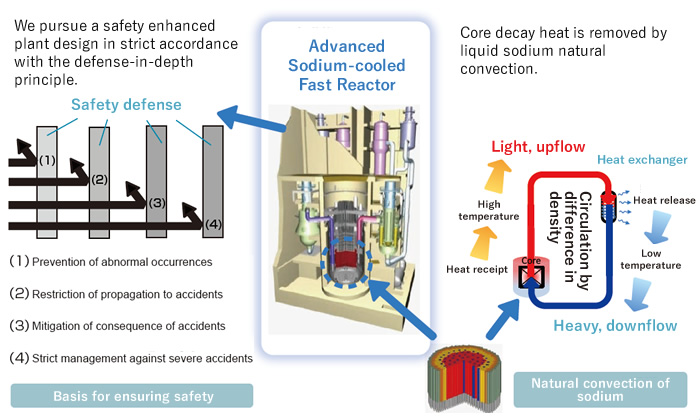
Through multilateral cooperation, we are establishing internationally standardized safety requirements for advanced sodium-cooled FRs.

Hierarchy of safety standards
Study for establishment of safety requirements

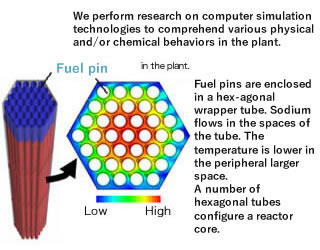
Sodium temperature distribution
Development of computational evaluation methods
Experimental Research on Safety Enhancement of Fast Reactor
We conduct experimental research and development for a severe accident with significant core damage for the safety enhancement of FR system. Achievements of R&D are reflected to the de-velopment of FRs.
Experimental R&D on decay heat removal in reactor vessel
In the FR plant system, core decay heat is designed to be removed by sodium natural convection even under the station blackout condition. In addition, we are carrying out tests to demonstrate the several methods for the core cooling in case of severe accident in the international col-laboration such as ASTRID project with France and the Generation IV International Forum (GIF).
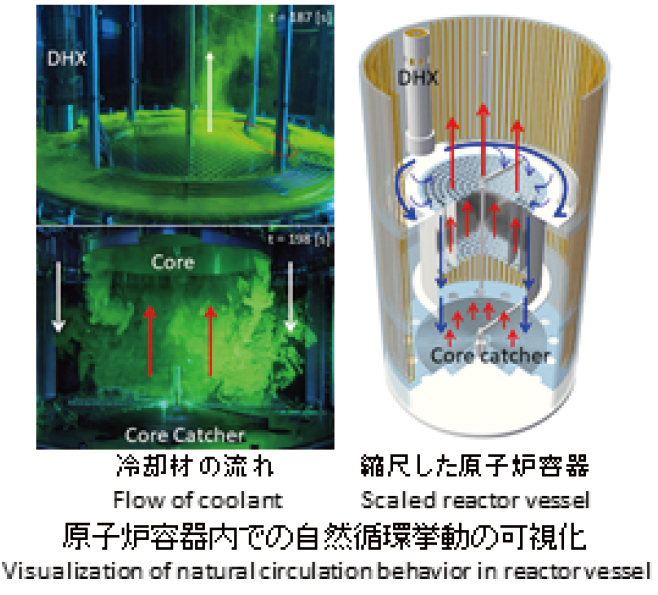
Experimental studies on the safety of reactor core and mechanical properties of the structures
We conduct experimental studies to clarify the behavior of molten core materials in case of core disruptive accidents and mechanical properties of the core and structural materials.
Knowledge obtained through above studies are reflected to safety evaluations of future domestic and international FRs.
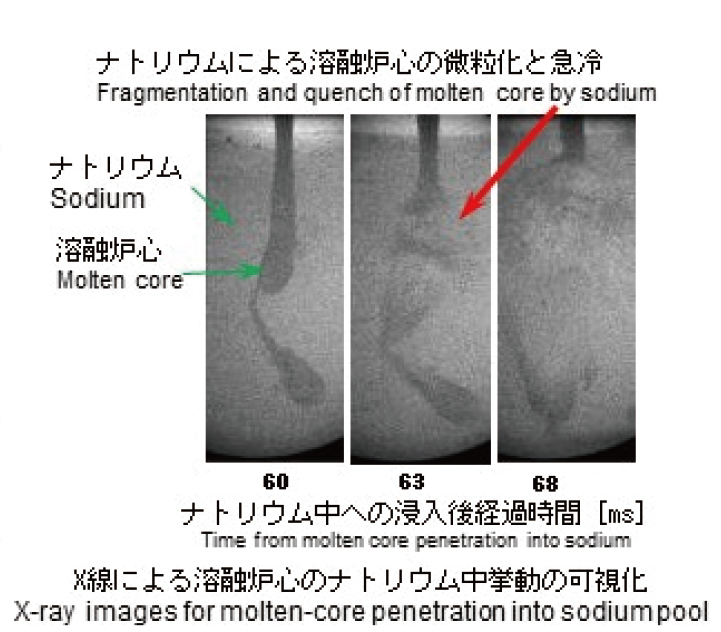
Experimental studies on suppression of chemical reactivity of sodium
We perform fundamental studies of nanofluid formed by nanoparticles and sodium atoms to investigate the suppression behavior of the chemical reactivity of sodium itself.
Obtained knowledge will be reflected to the safety enhancement of fast reactor.
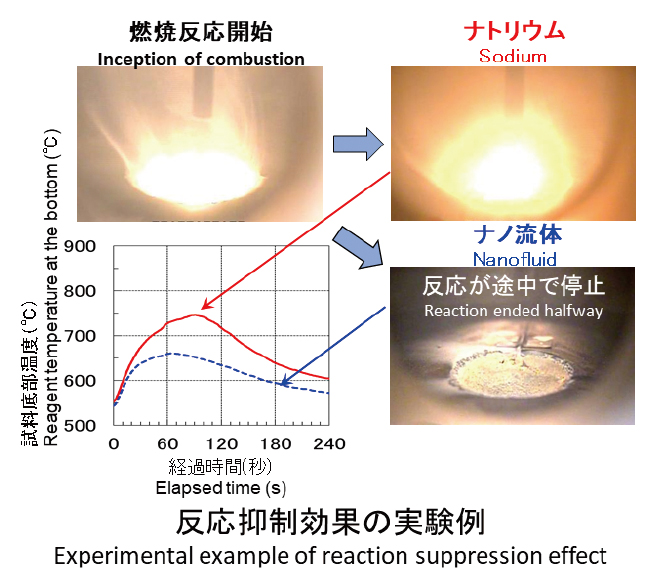
Experimental studies on ex-vessel event
As part of the severe accident research, we conduct experimental studies to clarify the "ex-vessel event" when the accident had extended out of the reactor vessel.
In recent years, we have been conducting experiments on aerosol transport behavior using simulated particles. We are also planning to start source term* experiments in the future.
*The types and quantities of radionuclides released to the environment
Experimental Fast Reactor Joyo
○Roles of Joyo
- Demonstration of basic sodium-cooled FR technologies.
- Irradiation testing of fuels and materials, and validation of innovative technologies for the development of future reac-tors.
- Basic research using high fast neutron flux.
○Joyo was upgraded in 2003 for enhanced irradiation performance.
⋅Reactor powe : 100 MW (applying)
⋅Fuel : MOX
⋅Reactor coolant : Sodium
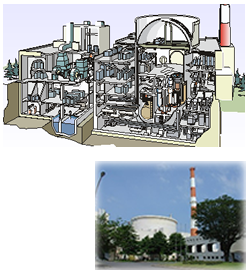
Safety demonstration
- Demonstration of decay heat removal by natural convection under the station blackout condition.
- To obtain MOX fuel irradiation performance data. (Power-to-melt tests, high burn-up tests)
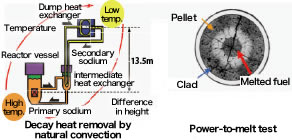
Respond to the needs of irradiation
- High fast neutron flux (3.0×1015 n/cm2⋅s)
- Development of capsule type rig
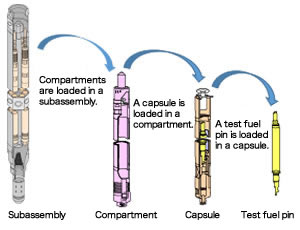
Capsule type irradiation subassembly
Volume and harmfulness reduction of radioactive waste
- Research on transmutation of long-lived minor actinides (MA) in fast reactors
- Two short-term irradiation tests of MA containing MOX fuels have been conducted.
Long-term irradiation test are planned.
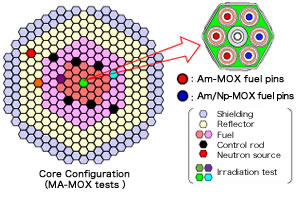
Post-Irradiation Examination Facilities
The post-irradiation examinations(PIEs) of FR fuels and materials irradiated in the experimental reactor Joyo have been conducted to investigate the integrity of irradiated fuels and materials for FR. Based on PIE technology and experiences, the R&D for reducing volume and harmfulness of radioactive waste is also promoted.
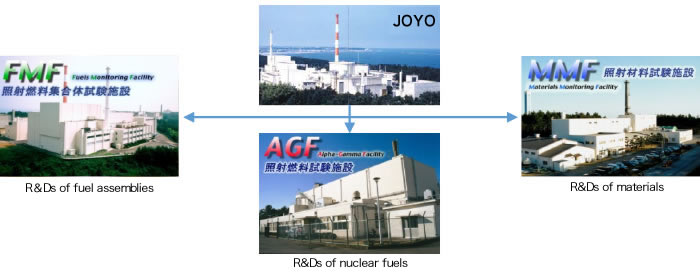
Research and development for volume and harmfulness reduction of radioactive waste
- Research on separation and transmutation of long-lived minor actinides (MA) in fast reactors to reduce the volume and harmfulness of radioactive waste.
- Planning a Small Amount of Reused fuel Test (SmART) using the existing PIE and other hot cell facilities.
Development of MAs-containing MOX fuel
- The R&D of MA-containing fuels, i.e. Am-containing MOX fuel has been carried out.
- The MA-containing fuels with good characteristics were successfully fabricated by a remote handling technique.
Irradiation test in Joyo, Post irradiation Examination
- Two short-term (10 minutes and 24 hours) irradiation tests of MA containing MOX fuels have been conducted.
- PIEs of MOX fuels for a FR are carried out, and their irradiation behaviors have been evaluated for a fuel design.
- Long-term irradiation test are planned.

Small Amount of Reused fuel Test Cycle concept
The SmART cycle research using a small amount of MA recovered from irradiated fuel is promoted to confirm the irradiation behavior of MA-MOX fuel and to demonstrate the consistency of an overall fast reactor fuel cycle system.



